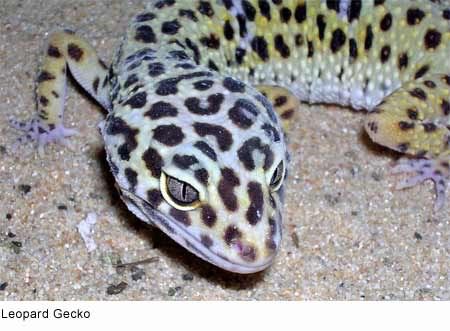posted January 02, 2009 01:18 PM


Leopard Gecko
Eublepharis maculariusLeopard geckos are relatively easy to maintain, and a good choice for the beginner. Most leopard geckos are captive bred, and not taken from the wild. They have a long life span, however, so be sure you are willing to commit to the care of the animals for years to come. They do not resent handling as much as other reptiles, but it is necessary to hold them properly. Do not hold or restrain the gecko by the tail, as it could break off. If the tail is broken off, it will usually regenerate, but may not look the same.
The Leopard gecko has yellow, brown, white, and, most recently, leucistic phases. There are usually dark brown spots on a white or pale yellow background. Young geckos have alternating bands of color which gradually break up into the spots or splotches as the animal ages. The skin has many knoblike bumps, giving it a rough appearance, though the skin is soft to the touch. The male is more heavily built than the female with a broader head and thicker neck. Males also have a V-shaped row of pre-anal pores, a wider tail base and post-anal swellings. Leopard geckos are unusual in that they have eyelids. They do not have clinging toe pads, so they can not climb vertical surfaces. The leopard gecko can live 15-20 years in captivity; some have lived up to 30 years.
The leopard gecko needs a steady supply of water. There should be a large rock in the water bowl to allow the crickets to climb out of the water. This will prevent them from fouling the water. Change the water daily. The crickets, or other live food should be fed a high quality food and dusted with both a vitamin and a calcium/vitamin D supplement before being fed to the gecko. Feed juveniles once a day, and adults every other day. For adults, use the calcium/vitamin D supplement every other feeding and the vitamin supplement twice a week. A small dish of calcium can be available in the tank at all times. After several hours, remove any uneaten crickets or other food. Obesity can be a problem for some geckos, so reduce the amount fed if your pet starts to look overweight.
Leopard geckos live on land, and generally do not climb, therefore it is important to have a long, shallow aquarium or other housing unit, versus a tall, short one. The substrate can be sand, artificial turf, paper toweling or newspaper. If using sand, you may want to feed the gecko in another cage to prevent the gecko from ingesting too much sand as he captures his food.
Leopard geckos are nocturnal and do not have the same need for ultraviolet light-B (UVB) as many other species. Although UVB light appears not to be necessary, some herpetologists recommend it. An incandescent bulb can be used to supply light and heat during the day, and a red bulb or ceramic heater at night. An under-tank heating pad may also be needed under part of the aquarium to provide a temperature gradient. Watch for any hot spots, however. Leopard geckos require a humidity of 40-60% for proper shedding. If the humidity is low, place moist peat moss in a hidebox made from plastic or Tupperwarebox, with a small entry hole. Mist the peat periodically to keep it moist.
Do not house two male leopard geckos together, as they will fight. If you house females, or a male and female together, increase the tank size as you add animals. A 20-gallon aquarium could house three. Leopard geckos are one of the easiest reptiles to breed.
When purchasing a leopard gecko, always have it examined by a veterinarian. Geckos may have intestinal parasites that could cause serious disease, and some can be transmitted to people. These parasites can be identified through examination of the feces, and effectively eliminated.
Quick Stats: Leopard Gecko
Family: Gekkonidae
Origin: Southern Asia, Pakistan to Northwest India
Size: 6 - 9 inches
Diet: Crickets, mealworms, grubs and maybe once a week or so, a pinky mouse
Water: Provided at all times
Terrarium: A 10-gallon aquarium; 15 for a pair
Substrate: Sand, newspaper, paper toweling
Decoration: Caves and rocks to climb on; hide/humidity box; keep it simple for cleaning
Lighting: Incandescent; full spectrum can be used but may not be necessary
Temperatures: 80°-85°F by day with a 90°F basking area; 70's by night
Compatibility: Do not house two males together; aggressive when breeding
Sexing: Males have post-anal swellings, a wider tail base, and V-shaped pre-anal pores leading to the vent
Source: Animal Planet's Reptile Guide http://animal.discovery.com/guides/reptiles/iguanas/leopardgecko.html

Please do not use this as your only definitive guide if you are planning on getting Leopard Geckos. Please purchase a book or two, and do plenty of research. Thank you.

 Lindaland
Lindaland

 Heathcliffe's Corner
Heathcliffe's Corner

 January 2009 Animal of the Month ~ Leopard Gecko
January 2009 Animal of the Month ~ Leopard Gecko

